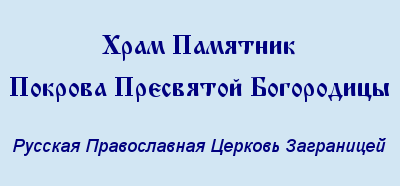Dear Brothers and Sisters in Christ,
Congratulations with the feasts of the Resurrection of the Lord and that of the Holy Equal-to-the-Apostles Great Prince Vladimir, and also with the feast of the Holy Fathers of the first six Ecumenical Councils!
Last week we marked the days of the Holy Equal-to-the-Apostles Princess Olga and the first martyrs of Russia, the Holy Martyrs Theodore the Varangian and his son John of Kiev. In a week and a half the Church will celebrate the memory of the sons of St. Vladimir, the holy brothers Boris and Gleb. In such a way, these summer days have within them a small liturgical cycle in which the saints which are most closely tied to the baptism of Russia are celebrated. All of us are descendants, either in a literal or spiritual sense, of those people who long ago, at the end of the 10th century, were baptized in Kievan Russia. Today we can remember with what zeal not only prince Vladimir, but all of the saints named above served the Lord. Let’s remember how the Blessed Olga, boldly accepted the Christian faith and faithfully preserved it, despite the pagan world she lived in and despite the pagan faith and temperament of her son. Let’s remember the first Russian martyrs Theodore and John and their uncompromising stance for faith in Christ. Let’s remember the repentance of the Holy Prince Vladimir, his love for the needy, his construction of churches. Let’s remember the wonderful meekness of the holy brothers Boris and Gleb. Let’s try to take them as examples for ourselves and emulate at least some of their Christian good deeds and, in such a way to serve our Lord as they did.
Along with the memory of Prince Vladimir, today, on the Sunday closest to the 27th of July, the Church celebrates the memory of the Holy Fathers of the first six Ecumenical Councils. The fact that we celebrate the Ecumenical Councils several times a year and that these celebrations are always on Sundays points out that these memorials are important and that every believer should be familiar with these councils and with those teachings that they defended. Therefore, throughout the following weeks, let’s try to briefly discuss each of the councils separately and to capture the essence of each of these church gatherings. In other words, let’s try to understand why this or that teaching or dogma of the Church is important personally for each of us.
Before we begin to discuss the First Ecumenical Council, we must define what is an ecumenical council. It would seem to be easy to answer this question, but there were many councils, held at different times, that called themselves ‘ecumenical,’ while in fact the Church has recognized only seven gatherings as being truly ecumenical. It is interesting to note that signs that would seem to be obvious markers of a council being ‘ecumenical,’ such as delegates from all parts of the Christian world or a large number of participants, are not considered essential for a gathering to be designated an ecumenical council. For example, the Pope of Rome did not participate in any of the Ecumenical Councils, and as a rule, only a small delegation represented the whole of the western Church at these meetings. It is also interesting to note that the second Ecumenical Council was not particularly well attended. Only 151 bishops attended this council. Perhaps it is possible to say that one of the things that makes a council ecumenical is that the teaching that was voiced and approved by the fathers of that gathering is considered mandatory for the entire Church. Also, each of the Ecumenical Councils was recognized as such by the following Ecumenical Council. In such a way, there is a direct continuity from the first to the last Ecumenical Council.
Today let’s fervently pray to the Holy Equal-to-the-Apostles Prince Vladimir, as well as to the holy fathers of the Ecumenical Councils, that we be preserved in the true faith, that we not fall into schism, heresy, or various superstitions, that we learn well and understand the teachings of our Holy Orthodox Faith.
priest Alexis







